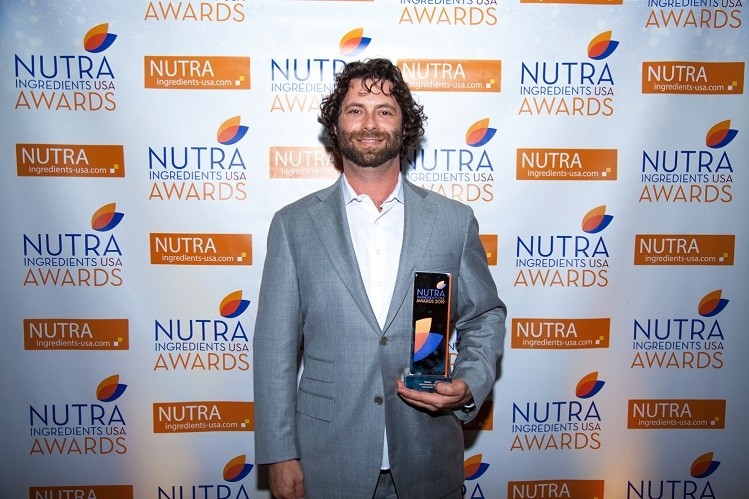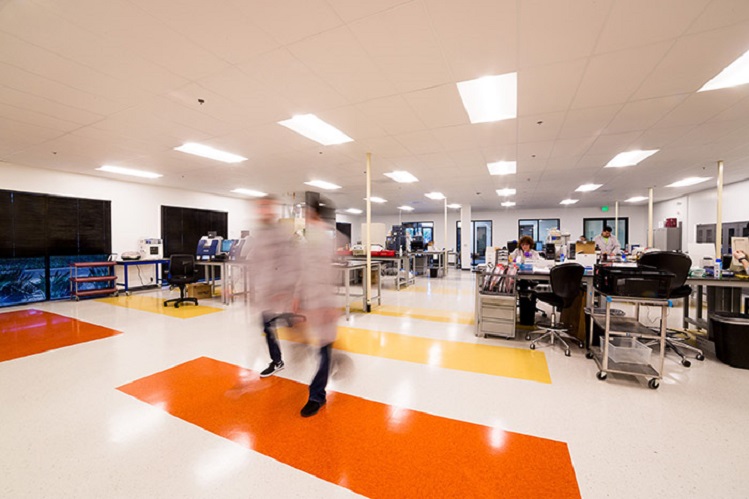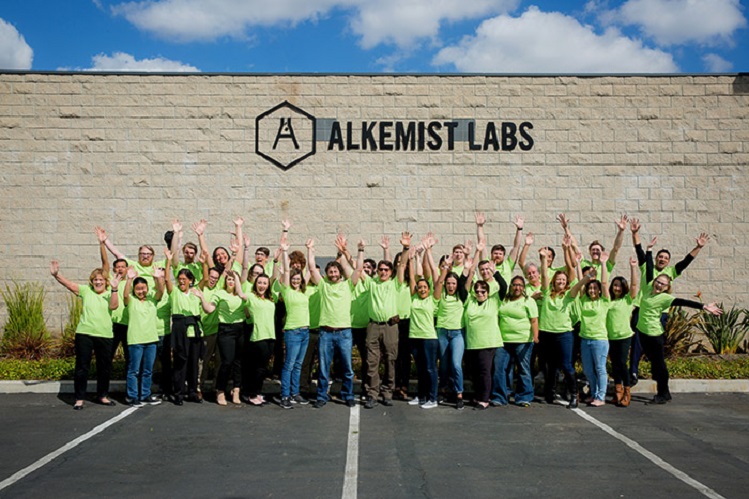Editor's Spotlight
Alkemist Labs CEO: 'It’s the personal touch that really matters'

Sudberg’s father Dr Sidney Sudberg, a retired chiropractor and acupuncturist, started Alkemist Labs in 1997 “accidentally,” as the younger Sudberg recalled.
“He had a line of herbal supplements, herbal tinctures. We were doing quality control for the incoming raw materials for tinctures, failed some materials, failed some more materials, and the vendors eventually asked us to do more testing,” he recalled.
“So suddenly we were doing testing for vendors and started becoming a lab a little bit accidentally.”
Today, the California-based analytical lab, which specializes in identifying and quantifying botanical ingredients and supplements, operates a 21,000-square-foot facility and has 40 employees. Its customers range from the largest pharmaceutical companies to some small one-to-two-person herb shops.
Sudberg started helping his father at the lab from day one, when he was fresh out of high school. “We both grabbed the bull by the horns together and have been partners in the business ever since,” he said.
We caught up with him after the NutraIngredients-USA 2019 Awards in New Orleans this week to talk about how the industry has changed since he first started, what keeps him up at night, and how he stands out from the other CEOs and leaders within the analytical lab space.
The following has been edited for clarity and length.
You’ve been in this business for many years now—how has the botanical space changed?
It's been an interesting ride because when we first started testing, it was mainly on extracts of plants, and they were generally really strong. Extracts are supposed to be stronger than the original plant material, and that’s what we were seeing.
Slowly and surely the industry changed to more dilute products, I don’t know if that was intentional, or if that was an oversight of not paying attention enough.
Also branded ingredients have come into play now, where these refined extracts are branded and have special properties to them, making testing a little bit more complicated. But it simply requires more of a relationship between the lab and the customer so there is communication rather than just sending a sample. The testing market is certainly a bit more complicated based on the ingredients and the scale of the industry and how many new players and new products there are now.
Has this changed the profile of your typical customers?
Yes absolutely. Our typical customer has changed over time as the industry has evolved. There are new players on the market, and they’re not all herbalists anymore. When we started the company, it was mainly herb companies with herbalists at the helm, and now there are a lot of marketing companies selling herbs.
It’s not necessarily a bad thing, it’s just changed the landscape in the sense that the speed of innovation is a little bit too fast to support the quality. There’s a lot of complicated finished products coming to market with no test methods created for them, so there’s really no way to have quality control ensured, it’s kind of addressed after the fact in a lot of cases.
These marketers-selling-herbs companies make up a big portion of the market now. I think that’s what’s capturing a lot of the business, the ones with big and aggressive strategic marketing with the branded ingredients and hot ingredients geared around some condition. That’s definitely shifting which ingredients are more popular and which aren’t.

What are your thoughts about these changes, in terms of the companies in the botanicals category as well as the products that are being launched to market?
Anywhere there’s a billion-dollar industry, other billion dollar industries want to be part of it. I think as a result we’ve seen some interesting innovations and growth, which is good and wouldn’t have come without the money, but I think there is a core principal requiring we remember that from which we came, which is the earth, which is plants—even pharmaceutical drugs, most of them come from plants.
We need to consider the power of plants as a medicine and not just get stuck with a particular fraction of a plant. For example, a lot of companies are using CBD just by itself instead of full-spectrum hemp extract. One is a fine chemical, one has many fine chemicals that work together
I was raised by my mother and father, my father was a chiropractor and acupuncturist and had a line of herbal tinctures. The tinctures he made were these full spectrum alcohol extracts, so with the synergistic effects of all of the plants, with all the chemicals that we were seeking and not just one particular chemical.
When we started the company, it was mainly herb companies with herbalists at the helm, and now there are a lot of marketing companies selling herbs.
Can you tell us your thoughts on whole plant versus these fine extracted chemical compounds?
I can give an example, I can drink espresso right before bed and fall right asleep. It has almost no impact on me. An espresso is a hot water extract of coffee beans and you get a bunch of stuff in that.
If I drink yerba mate from the Brazilian forest, any time after 3 o’clock, I’ll be up until 2 in the morning. It’s not the caffeine, because caffeine’s in both of them—it’s the multitude of their plant chemicals together that do the trick, and not these marketable fine chemicals.
You go back 10 or 15 years ago, you didn’t have branded phytochemicals like you see on late night television with their fancy names. That’s the image of big corporations in our industry, making the brandable phytochemical. It’s important not to forget about plants as a whole, plants as a synergistic medicinal property.
How has the change in the industry’s landscape affected the work of Alkemist Labs?
The testing has changed because the complexity of ingredients are changing. They’re no longer just hot water extracts of green tea dried into a powder and sent to our lab for analysis. Now there are all these various extraction forms.
And again they’re trying to reach some sort of target in the process, they isolate and fractionate other things and you’re left with just these, essentially, chemicals derived from plants and no longer the plant.
Our challenge as a lab is sometimes these things are made, then sold, then sold again, and by the time they get to us they’ve been sold three times and no one really remembers what it was. We test it, we fail it, it goes all the way back, time is wasted, then it comes right back to us and the customer would say ‘Oh, we forgot to tell you it’s a special extract you need to test it a certain way.’ So we test it with the correct method, and it passes.
The complexity of products requires more dialogue between lab and customer, which is great and fine, but that’s something that more people need to realize, they seem to still forget about it.
With rapidly changing technology and more complex ingredients on the market, how do you stay up to date with the latest science and technology?
I think being active as I am with the trade associations is very helpful. I’m on the board level in a few of them, including AHPA. Sitting as one of the few labs on the board level of some of these associations, I hear the complaints and comments of the purveyors of these products they’re trying to put out into the market. That’s one of the greatest ways to know what's happening on the ground.
We also have a really great relationship with most of our customers. We’re not just a testing lab. It’s like we’re an extension of their own lab. We’re like the upstairs person of their lab—when their lab can’t do it, they send it to us to sort it out.
You said you’re one of the ‘few labs’ represented at board levels at some of these associations. What does the competitive arena look like in the analytical lab space for dietary supplements?
I would say we’re all cooperative rivals at this point. There’s not too many categories, and there’s only two labs active in our industry that are small. Alkemist Labs and Flora Research. The others who may exist I won’t acknowledge because I don’t appreciate their quality of work, I think they’re doing a disservice to the industry.
Then there’s the big ones, there’s Intertek, SGS, Merieux, Eurofins, and NSF, and that’s it. It has changed quite a bit from the standpoint that five years ago there were probably five more small labs that have been gobbled up by the big labs. That has changed things a little bit because the clients, the consumers have less choices, less labs to go to, in one sense that’s good because then there’s less conflicting results and we can probably all talk together. Which we don’t—because we’re cooperative rivals.
We hug our clients. Our sales team out there loves our clients—we’re pretty much friends with them after only a few transactions.
I don’t think Eurofins talk with SGS or Merieux or Intertek. Alkemist and Flora work very well closely together, we don’t step on each other’s toes too often. It’s a competitive arena and it’s getting smaller every day, it seems. The big labs have been trying to purchase all the small labs.
In fact I tell this tale quite often that we were essentially told when we did not want to sell to one of the big labs about five years ago that there will be no small labs and we will get crushed, and they will send the steamrollers to crush us. We’re almost at year six, and they’re doing their share to try to kill us but we’re sticking around. We have no intention to leave this industry at all. We love what we do.
What makes you different from all the other labs?
In a few words, we know plants like no other lab. Plant testing, identity and potency is what we focus on. When the other labs were entering this industry, they were testing everything—dog food, metals, textiles, oil, gas, tilapia. We’re a plant lab, we stayed a plant lab. We touched vitamins for a while and decided it’s not our thing, the big labs do it already.
Also I think it’s the fact that people know the CEO of Alkemist Labs, and it’s not only because of our size, but the CEO of other labs generally aren’t as verbal, personal with the industry as I am. I think that makes a difference, we have a personal touch with all our service.
We hug our clients. Our sales team out there loves our clients—we’re pretty much friends with them after only a few transactions. We see each other at trade shows, we’re like old friends. It’s the personal touch that really matters.
Unfortunately, it’s hard to argue with a bank that that’s of value. It’s hard to argue to an investor that the personal touch has monetary value, but that’s something I’m working on—monetizing that.
As a CEO, what keeps you up at night?
Like a lot of people I worry about money. Maybe it’s a different picture for the CEO of a big company but we’re a small company and we’re in some ways fragile. Industry fluctuations can impact us a lot and what keeps me up at night is that I can’t always pay my staff more.
I would love very much to be able to pay every single one of them not just the living wage we pay, but a buy-a-house, have-a-family living wage. It would be really cool to have the minimum base line salary able to live and buy a home within convenient distance from the lab even given the high home prices around here. We already emphasize a healthy work and life balance, but I want them to have more.
That would be a dream of mine, and it’s a goal I work towards. The success in the industry comes when you have a happy staff and a great culture at work.
What did winning the NutraChampion award mean to you?
I can’t deny that it’s a huge ego boost. I’m proud of what I’ve done in my career here at Alkemist and it’s nice to see a plaque given by independent people to appreciate that.
What it means to me is that my voice has been important and meaningful, and as I mentioned, I don’t know the name of the Eurofins CEO or the Intertek CEO or the Merieux CEO or the SGS CEO, but the industry knows my name, and they know I care, and they know what my kids look like because I bring them everywhere.
I think this award to me was sort of solidifying the fact that that is important, that there is a cultural value to being vocal and passionate about the work that I’m doing.

















